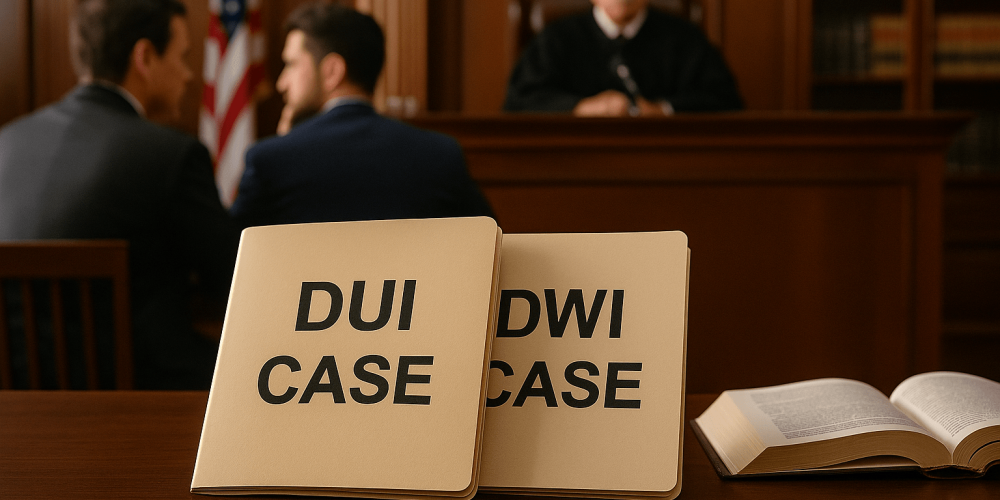Understanding the Legal Distinctions of DUI vs DWI
DUI vs DWI is a comparison that comes up often in traffic law, and the terms are not always used the same way across the U.S. DUI stands for “Driving Under the Influence,” while DWI can mean either “Driving While Intoxicated” or “Driving While Impaired,” depending on the state. While the two charges are closely related, they may have different legal definitions, consequences, and implications for your criminal record.
Knowing the difference between DUI and DWI can help you better understand your rights if you’re facing charges, and can also help you avoid them altogether.
What DUI Means and How States Use It
DUI is a criminal charge issued when a person drives while impaired by alcohol, drugs, or a combination of substances. The impairment may result from:
- Alcohol consumption
- Illegal drugs like marijuana or cocaine
- Prescription medications with sedative effects
- Over-the-counter drugs that impair alertness
In most states, DUI charges are based on Blood Alcohol Concentration (BAC). If your BAC is 0.08% or higher, you’re legally considered intoxicated and may be charged with DUI. However, even a lower BAC can result in charges if the officer believes your driving ability was impaired.
States like California and Florida use DUI as their official legal term. It generally covers both alcohol and drug-related impairment.
What DWI Means and When It Applies
DWI, on the other hand, is used in states like Texas and New York, where it may refer to a more specific or severe form of impaired driving. Depending on the jurisdiction, DWI may mean:
- Driving While Intoxicated by alcohol with a BAC of 0.08% or higher
- Driving While Impaired, regardless of BAC, due to drug use or lower levels of alcohol
In some states, DUI and DWI are two separate charges, where DWI may carry heavier penalties or imply greater impairment. In others, they’re interchangeable and mean essentially the same thing.
To find out how your state defines these charges, visit the DUI & DWI laws page or refer to NextLegal’s DUI & DWI definitions.
Legal Consequences of DUI vs DWI
Whether it’s DUI or DWI, both charges carry significant legal consequences. These may include:
- Driver’s license suspension (temporary or long-term)
- Fines and court fees, often in the thousands
- Jail time or probation, especially for repeat offenses
- Mandatory DUI or DWI education classes
- Installation of an ignition interlock device
- A criminal record, which can impact jobs, travel, and insurance
You may be required to attend DUI or DWI classes or install an ignition interlock device if convicted. The goal of these measures is both punishment and rehabilitation.
In states where DWI is perceived as more severe than DUI, individuals may encounter harsher penalties, even for a first offense.
Avoiding Both DUI and DWI Charges
Regardless of how your state defines DUI vs DWI, the best way to avoid charges is to make safe decisions. Here are a few simple rules:
- Never drive after consuming alcohol or using drugs
- Use a designated driver or rideshare service
- Stay overnight if you’ve been drinking
- Know your BAC with a personal breathalyzer
- Read medication labels for drowsiness or driving warnings
Visit the BAC Test Guide to learn how blood alcohol content is measured and monitored.
DUI vs DWI: Know the Law and Protect Yourself
Understanding DUI vs DWI is about more than legal definitions—it’s about protecting your future. Whether your state uses one term or both, impaired driving charges carry serious consequences that can last for years. Before getting behind the wheel, make smart choices. Also, know your rights if you ever get charged.
Charged with DUI or DWI? Speak with a Lawyer Today
If you’re facing DUI or DWI charges, time is critical. An experienced defense attorney can explain the difference between charges, protect your rights, and work to reduce penalties. Visit 1800DuiLaws.com now to schedule your free consultation.
Frequently Asked Questions (FAQs)
1. What’s the difference between DUI and DWI?
DUI usually refers to driving under the influence of alcohol or drugs. DWI may refer to a more severe form of intoxication or be used interchangeably.
2. Which is worse, DUI or DWI?
In some states, DWI is considered more severe than DUI. In others, they are the same charge.
3. Can you get a DUI for prescription drugs?
Yes. Any substance that impairs your ability to drive—even legal prescriptions—can result in a DUI or DWI.
4. What happens after a DUI or DWI arrest?
You may face license suspension, jail, fines, mandatory classes, and a court hearing.
5. Are DUI and DWI used in all states?
No. Some states use only one term; others distinguish between them with different meanings.
Key Takeaways
- DUI vs DWI varies depending on the state and level of impairment
- DUI typically covers alcohol, drugs, or both
- DWI may imply higher intoxication or specific substances
- Penalties include fines, license suspension, and jail time
- Legal help is crucial if facing impaired driving charges








